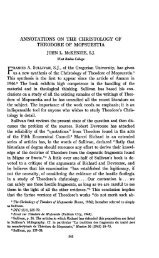Two Concepts of Attrition and Contrition - Theological Studies
Two Concepts of Attrition and Contrition - Theological Studies
Two Concepts of Attrition and Contrition - Theological Studies
You also want an ePaper? Increase the reach of your titles
YUMPU automatically turns print PDFs into web optimized ePapers that Google loves.
12 THEOLOGICAL STUDIES<br />
In spite <strong>of</strong> these differences <strong>of</strong> views with regard to the theology <strong>of</strong><br />
contrition <strong>and</strong> attrition, the fathers <strong>of</strong> the Council approve <strong>of</strong> a decree<br />
directed against Luther's rejection <strong>of</strong> the Catholic doctrine about the<br />
sacrament <strong>and</strong> about attrition. Here we find the distinction between<br />
contrition <strong>and</strong> attrition <strong>of</strong>ficially recognized by the Church. The discriminating<br />
factor is not clearly indicated. <strong>Contrition</strong> is said to be<br />
perfected by charity; <strong>and</strong> consequently attrition is not. <strong>Attrition</strong> is<br />
motivated by the consideration <strong>of</strong> the ugliness <strong>of</strong> sin or by the fear <strong>of</strong><br />
the punishments <strong>of</strong> sin. This attrition is good <strong>and</strong> helpful in the<br />
sacrament. How <strong>and</strong> in what precise way it helps for justification in<br />
the sacrament is left unsaid. 40 The discussed formula "ex attrito fit<br />
contritus," which was <strong>of</strong> little use in affirming the Catholic doctrine<br />
against the Protestants, is left out.<br />
6) Post-Tridentine theology will keep to its different views <strong>and</strong><br />
positions <strong>of</strong> which Trent respected the freedom. The Tridentine decree<br />
however will have a definite effect on the Scholastic teachings about<br />
attrition-contrition. First, the discrimination <strong>of</strong> perfect <strong>and</strong> imperfect<br />
contrition from their motives, insinuated in Trent, which explicitly<br />
stated the ordinary motives <strong>of</strong> attrition, seems to become commonly<br />
accepted, either as an isolated criterion, or in combination with<br />
the formerly accepted distinctive marks—completeness or incompleteness<br />
<strong>of</strong> the sorrow <strong>and</strong> its information or non-information by charity.<br />
According to the interpretation given to the adage "ex attrito fit<br />
contritus," namely, when understood <strong>of</strong> a mere extrinsic raising <strong>of</strong><br />
attrition through the habitus <strong>of</strong> charity, or <strong>of</strong> an intrinsic completing<br />
<strong>of</strong> the sorrow, the attrition which is sufficient <strong>and</strong> helpful for the fruitful<br />
reception <strong>of</strong> the sacrament will be required to have more or less<br />
high motives. And it is precisely this shift from the objective <strong>and</strong> ontological<br />
to the subjective <strong>and</strong> psychological discrimination <strong>of</strong> attrition<br />
40 It would seem altogether vain <strong>and</strong> open to merely subjective interpretation, to endeavour<br />
to discover which theological systems this decree favours. As is well known, the<br />
text <strong>of</strong> the chapter <strong>of</strong> Trent on contrition-attrition was made so as to exclude the Protesttant<br />
errors <strong>and</strong> to leave aside all theological discussions (Cf. H. Lennerz, S. J., "Das Konzil<br />
von Triente und theologische Schulmeinungen," in Scholastik, IV (1929), pp. 38-53. A<br />
concrete example as to how the study <strong>of</strong> the modifications <strong>and</strong> omissions to which the<br />
successive texts <strong>of</strong> the chapter were submitted leads to different conclusions we may find<br />
in the different interpretations given to the omission <strong>of</strong> the ex attrito fit contritus, by Cavallera,<br />
op. cit., pp. 132-34, <strong>and</strong> Michel, op. cit., 1095; cf. also Perinelle, op. cit., pp. 65-68<br />
whose interpretation has been rightly called tendentious.

















